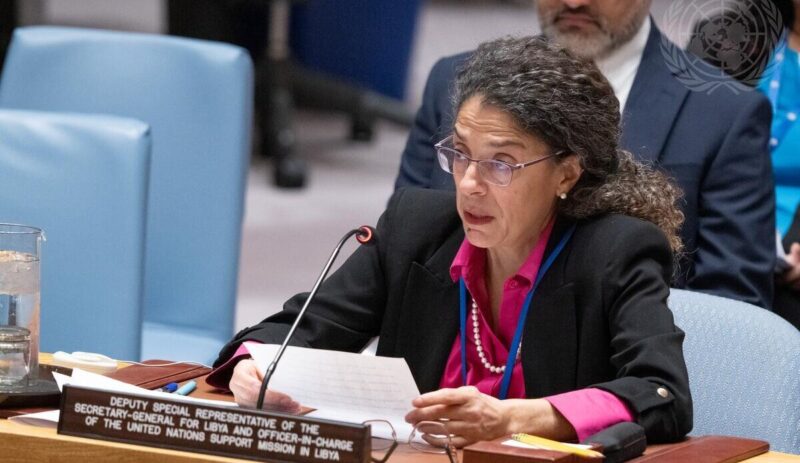UN’s Libya envoy urges reforms as crisis deepens

UN Deputy Special Representative to Libya, Stephanie Koury, presented her proposal for a new advisory committee to the Security Council on December 16, delivering a stark assessment of Libya’s deepening political crisis.
Security Council Briefing
In her comprehensive briefing, Koury warned that the current political framework, established under the Geneva Agreement, “remains controversial and won’t lead to successful elections without modifications.” She emphasised how unilateral measures have eroded Libyan state institutions, specifically citing the recent Central Bank crisis as evidence of political stagnation.
“The current status quo in Libya has lasted too long,” Koury told the Council, highlighting how ongoing leadership divisions within key institutions are hampering governance capabilities. Her proposed time-limited advisory committee would comprise prominent Libyan figures and experts, with Koury stressing its role would be “consultative rather than decision-making.”
International Response
The Security Council session revealed deepening international divisions over Libya’s future. Russia’s Permanent Representative to the UN, Vasily Nebenzya, urged Secretary-General António Guterres to expedite the appointment of a new UN Special Representative to Libya. Nebenzya expressed specific concerns regarding Western banks’ involvement with frozen Libyan assets and called for the UN team in Tripoli to prioritise creating conditions for effective mediation.
The US representative raised direct concerns about Russian military materiel reaching Libya and commended the UN expert panel’s identification of entities violating the arms embargo. They specifically highlighted the ongoing issue of illegal oil and petroleum products exports benefiting criminal organisations.
Domestic Developments
On December 17, Presidential Council member Abdullah Al-Lafi announced formal support for the UN-led initiative. Similar endorsements followed from High State Council figure Khaled Al-Mishri, the National Front Party, and the Supreme Council of Libyan Amazigh.
Political analysts note, however, that such public expressions of support warrant scrutiny, given the established pattern of political figures maintaining positions that preserve their influence whilst publicly endorsing reform initiatives.
International Diplomatic Position
A joint statement from the embassies of France, Germany, Italy, the United Kingdom and the United States welcomed Koury’s initiative. However, regional observers emphasise that these nations have consistently failed to exert effective pressure on actors impeding Libya’s political progress over the past decade.
Algeria’s Permanent Representative to the Security Council, Ammar Ben Jamea, whilst supporting Koury’s proposal on December 18, explicitly raised concerns about the prolonged vacancy in the UN Special Representative position, aligning with the Russian position on this matter.
Parallel Political Process
Concurrent with Koury’s Security Council briefing, delegations from Libya’s House of Representatives and High State Council convened in Bouznika, Morocco. Their discussions resulted in agreement to establish specialised committees focusing on development budget distribution, security sector reform, sovereign appointments, and financial oversight. The committees will address equitable resource allocation, coordination with the 5+5 Joint Military Commission on foreign forces withdrawal, criteria for key institutional positions, and protocols for implementing a national census and anti-money laundering measures.
The councils scheduled their next meeting for 19 January 2025 in Derna to finalise the preliminary phase agreement.
Fundamental Challenges
The core dispute over executive authority continues between the Government of National Unity, led by Prime Minister Abdul Hamid Dbeibeh, and the legislative bodies. Dbeibeh maintains his government will only transfer power to an elected administration, as explicitly stipulated in the Geneva Agreement, whilst rival political bodies actively seek its replacement.
Koury emphasised in her briefing how reconciliation efforts continue to be undermined by both political divisions and competition between armed groups for resources and territorial control, presenting an ongoing threat to national stability.
Analysis and Outlook
The Bouznika agreement, whilst presenting the appearance of progress, may represent another iteration in Libya’s pattern of political delay. Without substantial international pressure comparable to that which produced the Skhirat and Geneva agreements, diplomatic observers suggest Libya is unlikely to achieve either elections or meaningful political reform in the immediate term.
The situation underscores the international community’s limited effectiveness in resolving Libya’s political impasse, despite repeated diplomatic initiatives.
The convergence of entrenched domestic political resistance and international division continues to obstruct progress toward establishing stable governance in Libya.
How to submit an Op-Ed: Libyan Express accepts opinion articles on a wide range of topics. Submissions may be sent to oped@libyanexpress.com. Please include ‘Op-Ed’ in the subject line.
- HoR speaker, UN envoy meet on unity push - January 21, 2025
- New Oil Well Bolsters Libya’s Production Capacity - January 21, 2025
- Turkish TPAO Poised to Invest ‘Billions’ in Libya - January 20, 2025


